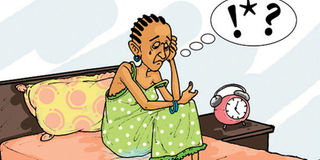Don’t be shy to talk about bedwetting

Try to talk about your situation to a doctor rather than keeping it to yourself. PHOTO | DAILY MONITOR
What you need to know:
- As a junior doctor at the hospital during that time, I spent most of my time at Outpatient Department (OPD) and I was assigned to attend patients of all sorts as a general practitioner.
- One day, a secondary school girl, 15 years of age, visited my office as per hospital formalities. She was a form three student at one of the secondary schools in Moshi.
A few months after completing my medical internship, about two years ago, I got an opportunity to work at one of the famous hospitals in Moshi District, the Kilimanjaro CRCT Hospital—it’s here that I recall my experience with a case of bedwetting, as I endeavour to give insights on the subject.
As a junior doctor at the hospital during that time, I spent most of my time at Outpatient Department (OPD) and I was assigned to attend patients of all sorts as a general practitioner.
One day, a secondary school girl, 15 years of age, visited my office as per hospital formalities. She was a form three student at one of the secondary schools in Moshi.
Of course, the girl didn’t want to tell me much about her problem. Rather, she hinted that she had come to the hospital to collect her medication, although she could not recall the names of the meds. She could only describe what they looked like.
However, after a lengthy conversation, as I documented her medical history, she revealed her problem—she said she was a night bedwetter.
Before prescribing the meds that she wanted, I kept probing her on some important issues with regard to her condition.
“Why was this drug prescribed for you,” I asked. She reverts, “inanisaidia sana.” (it helps me a lot). “Sasa doctor ulitaka niendelele kuaibika bwenini?”[Without it, I will continue being embarrassed in the dormitory.]
What is bedwetting?
It’s an unintentional passage of urine that occurs in a person aged 5 or 6 years. Less than 5 per cent of children can wet their bed by age of 8 to 11. It’s known as “enuresis” in a doctor’s language.
For infants and young children, urination is involuntary, bedwetting is normal for them—not for adults.
In 2016, I wrote an article in Your Health, about children’s milestones, development and growth.
I had pointed out in that article that children usually achieve some degree of bladder control by 4 years of age—day time control is always achieved first, while night time control comes later.
However, the age at which bladder control is achieved varies considerably.
It’s therefore important to note that; bedwetting is common in boys, but this time, the case I encountered was that of a girl.
It is also said that, bedwetting has a tendency to run in families, did you know that? Well, it’s believed that children become dry at the same age their parents did.
Now, back to the story of the 15-year-old girl from Moshi. She actually told me that she has had the problem since she was a little child.
“My mother tried to punish me to get me dry at night. It didn’t work. I felt so bad. I once told my mom that she should not beat me, because I didn’t know how to control it,’’ the girl said.
She also recalls her mother telling her, “Wenzako wote hawakojoi kitandani isipokuwa wewe, sasa nakupeleka ukasome boarding, yaani kule ukijikojolea kitandani walimu watakuchapa”. [the mother warned her to stop bedwetting and that she would now be taken to a boarding school where teacher would beat her for doing it.]
The girl says, “My mom had to let me sleep on a carpet well fitted for my bed, I was a heavy bedwetter, I always soaked my bed at home. I was ridiculed and punished for my constant bedwetting.”
“The other day, my mother was advised to let me wear nappies at night. They were not fitting me. And, by the way, she did not have enough money to buy the nappies every day. Yet, the nappies usually leaked,’’ she says.
And she adds, “This always left me feeling so embarrassed and emotionally disturbed.”
So what causes it?
Sometimes, bedwetting can be a symptom of underlying disease; however majority of the children who wet the bed have no underlying illness.
So, it’s only in a small percentage of the children where an organic cause is identified.
As it has been noted earlier, delayed development of night time bladder control is one of the causes of bedwetting, plus others such as diabetes mellitus, constipation, Urinary Tract Infection (UTI) and emotional or physical stress.
Doctors usually classify bedwetting as either primary or secondary. If the bed wetting occurs after the child has been dry for some years or so, it will be known as “secondary enuresis” that means a specific cause can be looked into.
But in primary enuresis, it usually means that it is the habit of the child to wet the bed.
Treatment
Doctors wouldn’t recommend taking medication to control the problem. Researchers, in one of the papers that appeared in the Journal of Urology found that when children followed their doctor’s advice about bedwetting solutions, they were dry earlier than a group of children whose parents picked medication to stop bedwetting on their own.
Sometimes in Tanzania, such children are given very common drugs but doctors would initially recommend the following methods to stop bedwetting instead of using medication:
• Make sure your child goes to the bathroom before her bedtime.
• Limit fluid intake at/before bedtime.
• Wake him/her up in the middle of the night to empty the bladder. Some of the doctors discourage this approach since it may cause frustrations and sleeplessness.
• Shift times of drinking- increase fluid intake earlier in the day and reduce it later in the day.
• Be encouraging, reward success. When a child wakes up dry, reward him/her.
• Eliminate bladder irritants at night, start by eliminating caffeine (cocoa, chocolate milk) or thereafter cut down citrus juices, artificial flavourings, dyes (especially red ones) plus sweeteners.
• Strictly do not resort to punishment.
8. In some places, they may opt for wearing Urinary Bed alarms.
9. Do not speak about her problem in front of other people.
Are you a bed-wetter? Don’t get confused! The good news is that researchers have found that when children follow their doctors’ advice about bedwetting solutions they get dry earlier than a group that chooses to take medication.
The author is medical doctor, young scientist and a researcher.




